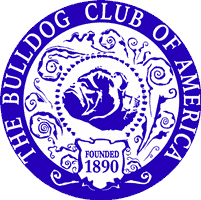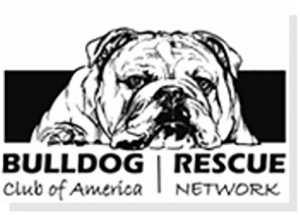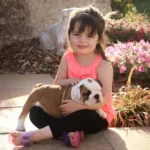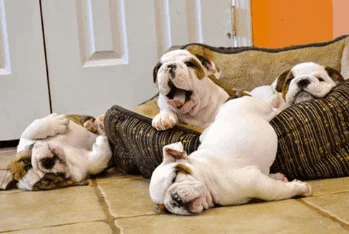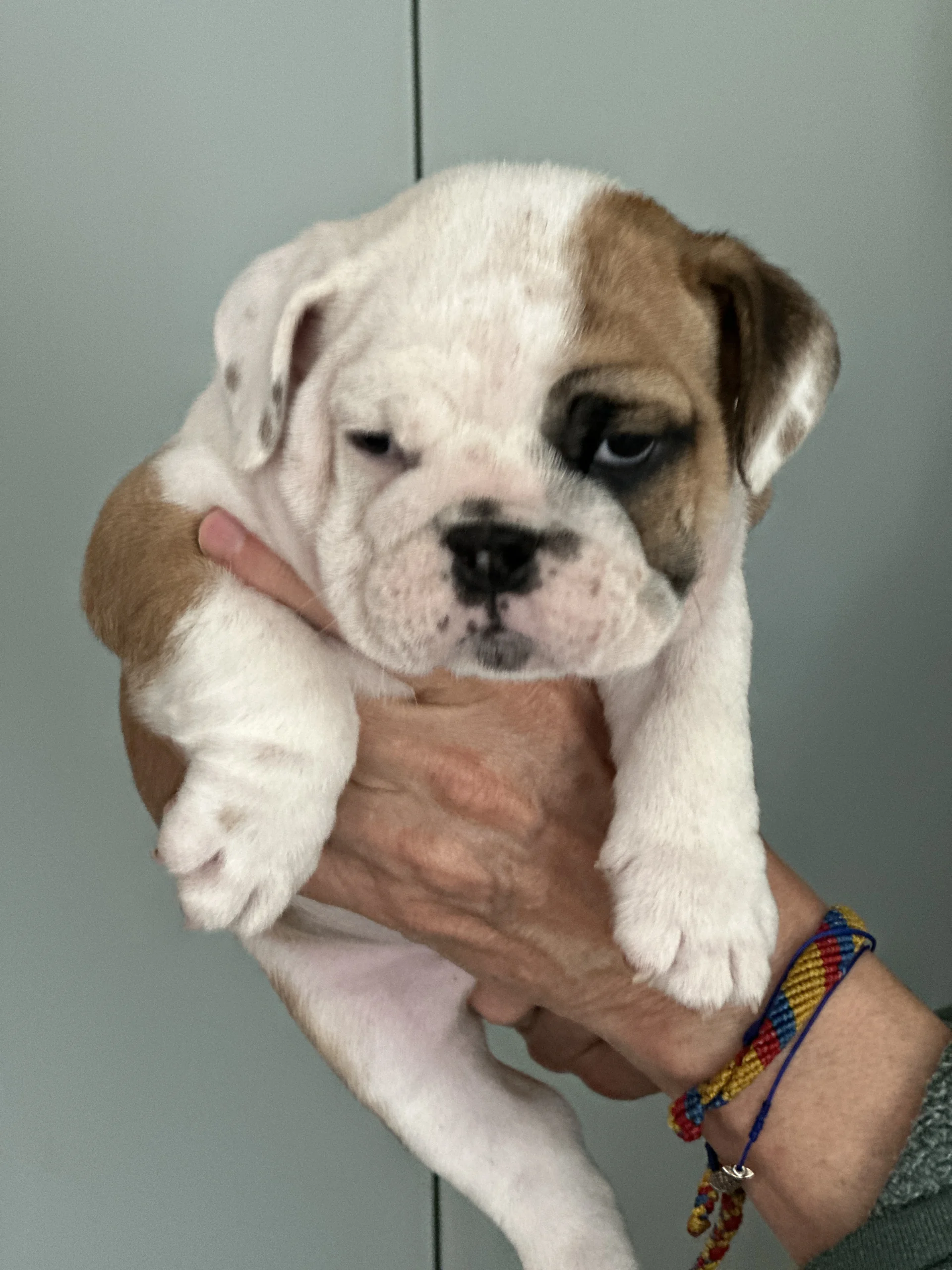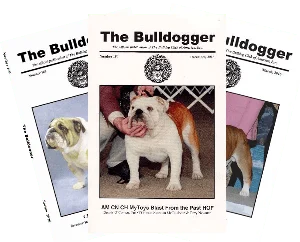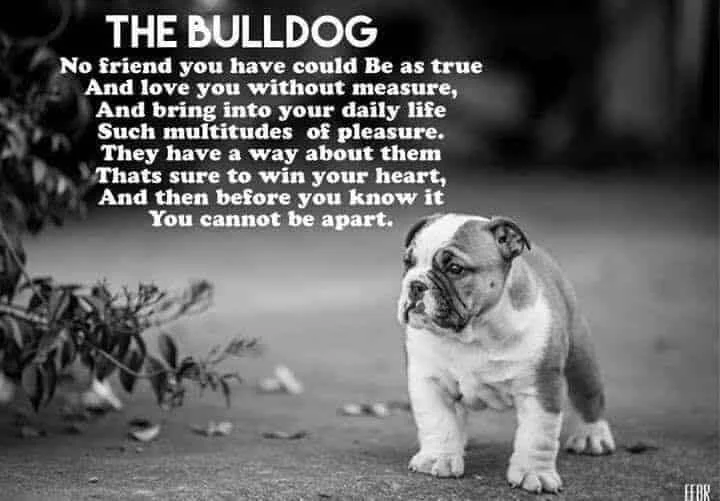Among companion animals, Bulldogs are unmatched in their devotion, loyalty and friendship to humankind. Anyone who has ever loved a dog can attest to its hundred-fold return. The excitement your dog shows when you come home, the wagging tail at the sound of the leash being taken from its hook, the delight in the tossing of a tennis ball, and the head nestled in your lap-those are only some of the rewards of being a dog owner.
Owning a dog is not just a privilege - it's a responsibility. These animals depend on us for, at minimum, food and shelter, and deserve much more. If you are considering taking a dog into your life, you need to think seriously about the commitment that dog ownership entails.
The BCA is is committed to helping dog owners raise happy, healthy dogs. The American Kennel Club (AKC), a dog registry for purebred dogs, has prepared a list of 101 suggestions for dog owners of all breeds. Their list, restated for Bulldog Owners or those considering to be Bulldog Owners, is presented on the first 10 sub-pages in the tabs below. The list is not exhaustive, so we are adding additional pages at the end of the section so you have the information to be the best dog owner you can be.
Think before you buy or rescue
Recognize the Commitment
Bulldog ownership is not something to be entered into lightly. Owning a bulldog is a long-term emotional and financial commitment. Before deciding that a bulldog is right for you, you must make an honest assessment as to whether your home is right for a bulldog.Evaluate Your Lifestyle
If you get a bulldog, he (or she) will become a part of your life. You need to make sure that he's suited for your lifestyle. All aspects of your family's life - hobbies, activities, personalities, schedules - should be evaluated before you get a bulldog.Make a List
Based on your evaluation, determine what qualities you want in a bulldog. Consider size, energy level, grooming needs, trainability and temperament. Is it important that your bulldog get along with children? If you rent your home, are there restrictions on height, weight or breed? Answer these questions now - once you bring a bulldog home, it can be heartbreaking to realize that you made the wrong choice.Choose a Breed
Once you have made your list of ideal characteristics, do some research to find which breeds fit that profile. Go to your local library, attend a dog show, and visit the AKC website. Narrow your choices to the breed that seems right for you.Get a Referral
You have a much better chance of being satisfied if you get your bulldog from a responsible, ethical breeder whose primary concern is to produce bulldogs of high quality, good health and stable temperament. See Breeder Referral.
Make Contact
Get in touch with the bulldog breeders in your area. Let them know that you are interested in acquiring a bulldog. Be able to demonstrate that you have put thought into your choice. Don't be discouraged if the first breeder you talk to does not have puppies available right away. That person may know another breeder in the region.
Ask Questions
Ask the breeder any questions you can think of about the breed. When you find a breeder you're comfortable with, ask to visit the kennel and view the bulldogs on the breeder's premises. Inquire about health problems of the breed, and what can be done to prevent or control them. Find out what kinds of activities, including competition, the breeder's bulldogs participate in and enjoy. The breeder's bulldogs are a preview of what your bulldog will be.Consider an Older Bulldog
Puppies aren't for everyone. If an older bulldog better fits your lifestyle, check with BCARN Rescue. These organizations rescue purebred bulldogs that have been lost, abandoned or surrendered due to the death or illness of their owners. Most rescue bulldogs have been spayed or neutered and are screened for health and temperament problems. Rescue is a not only a great source for purebred bulldogs, it's also a way to save the life of a bulldog in need.Expect Questions
A responsible breeder or rescue contact will ask you extensive questions about the type of home you can offer a bulldog. These people are as committed as you are to making the right match between you and a bulldog. Give honest answers to their questions. Remember that, due to their experience in the breed, they know what issues are important in placing one of their bulldogs.Prepare to Wait
Availability varies. Be aware that a puppy or bulldog of the breed you've decided on may not be easy to find. Responsible breeders do not breed often, and many times the puppies of a planned breeding are already spoken for. Just remember that a good bulldog is worth waiting for.Skip the Holidays
Many people try to buy puppies as Christmas gifts for children or other family members. Most breeders do not recommend this. You should be prepared to give a new puppy your undivided attention, and that is rarely possible during the busy holiday season. A better idea is to give bulldog-related gifts - toys, leashes, grooming tools - and then bring your puppy home when all the excitement has died down.
Make the Commitment
Pick Your Pet
When the time has come to select your pet, consider your options carefully. Respect your breeder's input about which puppy is right for you. If you are rescuing an older bulldog, ask your contact person for information on its health, temperament, behavior and history.Get It in Writing
Information about the sale or adoption should be in writing. The contract should include, for example, details regarding any fees, spay-neuter agreements, health guarantees, terms of co-ownership, restrictions on breeding, and living arrangements. It should also include instructions on what to do if the bulldog, despite your best efforts, simply doesn't work out for you or your family. Most responsible breeders will insist that the bulldog be returned to them.Get Your Papers
Get your AKC registration application from the breeder when you purchase the puppy. Make sure the breeder completes the appropriate sections of the form and signs it. The breeder can also help you fill out your section correctly.Register Your Bulldog
Send the completed, signed registration application to the AKC. Your bulldog will then become part of the nation's largest registry of purebred bulldogs and as well as being eligible for a variety of competitive events can also receive 60 days of introductory, no-cost healthcare insurance through the AKC Pet Healthcare Plan. If you rescue a bulldog, consider applying for an Indefinite Listing Privilege (ILP) number. This number will allow your bulldog to participate in some performance events.
Get ready for your new pet
Prepare Yourself
Get ready for your new friend before you bring him home, to make sure the transition will be as smooth as possible. Buy food, treats, a collar and leash, toys, grooming tools and other necessities in advance so your bulldog or puppy will have everything he needs.Make a Schedule
You and your family members should decide who will be responsible for food, water, walking, exercise, clean-up and grooming. Post a schedule of tasks in a visible area of the house to remind everyone of their responsibilities.Bulldog-Proof Your Home
Prepare your home before your new bulldog arrives. Move breakables or "chewables" to higher ground. Make electrical cords inaccessible to curious paws and noses. Block off any area of the house that you want off-limits to the bulldog. Put the lid down on your toilet and your shoes up in your closet. Block access to any house or garden plants that may be toxic to bulldogs.Set a Containment Policy
It is essential that you have a secure method of keeping your bulldog on your property. Check your fence for spots vulnerable to chewing or digging. If your yard is not fenced, consider a large bulldog run or invisible fencing. If your property is not fenced in some way, stress to family members that the bulldog must be leashed at all times when taken outdoors.Get a Collar
Your bulldog should wear a flat leather or nylon collar with a buckle at all times, except when in a crate. (The buckle can catch on the crate and cause injury.) The collar should be tight enough that it will not slide over the bulldog's ears, but loose enough that you can fit two fingers between the collar and the bulldog's neck. Check the fit of the collar often, especially if you have a fast-growing puppy.Make a Bed
Every bulldog needs a quiet place to call his own. Create a comfortable area, whether a crate, a mat or a pile of blankets, for your bulldog to go to when he needs rest or privacy.Buy Some Toys
Provide your bulldog with a variety of toys to prevent him from playing with your socks and shoes, your morning paper, or your child's favorite doll. Get some toys that you and your bulldog can play with together, such as balls and plush toys, and some things to keep him busy when he's alone, such as chewies or rope bones. Never leave your bulldog unattended with any toy that has small, detachable parts.Find a Veterinarian
You should choose a veterinarian for your bulldog as soon as possible. Have your bulldog examined by the vet within a few days of his arrival. Give your vet copies of the bulldog's health records, and set up a vaccination and check-up schedule. A list of Bulldog approved Veterinarians can be found Here.
Bring your Bulldog home
Welcome Your New Pet
At last! You've made all the preparations, and it's finally time to bring your new friend home. Give him the best welcome possible. With love, patience and mutual respect, he will feel like part of the family in no time.Let Your Bulldog Adjust
Give the bulldog time to adjust to his new home. The bulldog is bound to feel insecure and frightened by a change in environment, and a pup may be homesick for his mother or littermates. Show him to his crate or bed, and where to find food and water. Then leave him alone to explore the new surroundings.Name Your Bulldog
Your bulldog will need a good name. Your breeder may have suggestions or even requirements for his AKC-registered name, but his call or informal name is up to you. Older adopted bulldogs can adjust quickly to a new name.Make Introductions
Introduce your bulldog to your household slowly. Many pairs of hands petting him at once will only frighten him. Later, introduce him to neighbors, regular visitors and other family members. Give your bulldog a sense of who your - and your bulldog's - friends are.Introduce Other Pets
Other companion animals in your home should also be properly introduced to your new bulldog or puppy. Don't expect them to get along right away, and don't try to force them to play together. Give them time to adjust to one another.Housetrain
Whichever method of house training you have chosen - crate training, paper training or litter box - make sure that all members of the family enforce it consistently. Accidents happen, so have a procedure for clean-up.Set House Rules
Teach your bulldog from the beginning what is and is not appropriate behavior. If something is "OK" today, your puppy will think it's OK forever. Make sure that every member of the family enforces the house rules. Consistency is the key to having a well-behaved pet.
Prepare for problems
I.D. Your Bulldog
Your bulldog should wear an identification tag with your name, address and phone number at all times. This will increase the chances of your bulldog being returned to you if he is lost or runs away.Microchip your Puppy
Microchips are methods of permanently identifying your bulldog, and can be invaluable in recovering your bulldog should he become lost. Always register the microchip to yourself with name, address, phone and if possible your local vet.Provide Shelter
Your bulldog needs a sheltered area for the time he spends outside. The shelter should provide shade in summer and warmth in winter.Watch the Heat
Bulldogs can succumb to heat stress in a matter of minutes. Do not leave your bulldog in the car when the temperature is high. When your bulldog is outside, he should have a shady place to lay down and plenty of fresh, cool water.Travel Safely
Keep your bulldog safe in the car by using a crate, or by attaching the bulldog to a seat belt with a harness. Never let your bulldog ride free in the back of a pickup truck, or allow him to hang his head out of the car window.Find a Pet-Sitter or Boarding Kennel
Make arrangements for your bulldog's care when you go away. Have a friend or reliable pet-sitter come over to tend to the bulldog, or find a good kennel for boarding. If you opt for boarding, try to inspect the facilities before you drop your bulldog off.Prepare for Disaster
Be prepared to care for your bulldog in the event of a disaster such as fire, flood, hurricane or earthquake. Make an emergency kit with clean water, food, and first aid equipment. Find out in advance if the evacuation shelters in your area allow animals. If not, develop alternatives.Establish an Emergency Contact
Enlist a family member or friend to take care of your bulldog in the event of a sudden illness, hospitalization or other emergency. This person should ideally be someone your bulldog has spent some time with and is comfortable with. Leave a list of general care instructions in a safe place.Make a Will
You should make arrangements for the safety and care of your pet in the event of your death. Don't assume that a family member will step in to take care of the bulldog.Take Pictures
Of course, you will want a picture of your bulldog to grace your desk or to send as a Christmas card. More importantly, a current photo will be invaluable in the event that your bulldog is lost.
Be a friend to your puppy
Play!
Bulldogs, of course, love to play. Set aside time each day for play sessions. Apart from the obvious benefit of having fun together, play also provides an outlet for your bulldog's energy.Go On Walks
Take your bulldog on frequent walks. He will enjoy exploring the neighborhood and will benefit from the exercise. Make sure that you have a good strong leash and that you maintain control of the bulldog at all times.Talk to Your Bulldog
Your bulldog won't understand your words, but he will enjoy the sound of your voice. Talking to your bulldog will make him feel involved. You can also use different voice levels to praise or correct your bulldog's behavior.Give Treats
Your bulldog will always appreciate a treat, and treats can be used as a supplement to his regular diet, as well as an excellent training aid.Love Your Bulldog
Your bulldog will love you no matter what. Return the favor.Switch Out Toys
Keep your bulldog entertained by rotating his toys. Put "old" toys out of sight for a month or two and then bring them out again - your bulldog will enjoy them just as much as when they were new.Give Your Time
You are the center of your bulldog's world. You may be tired after a long day at work, but your bulldog has spent the day anxiously awaiting your return. Reward that loyalty with your time. Pet him, talk to him, play with him, laugh with him. Let your bulldog know you value his company.Find the "Spot"
Scratch your bulldog's belly often. If you find the "spot," so much the better.Leave the Radio On
Try leaving the radio or television on when you leave your bulldog alone. The noise will keep him company.Plan Activities with Your Bulldog
Include your bulldog in family activities. Take him to the park or on outings to the beach, or to special activities such as the "Bulldog Olympics" or bulldog parades. Your bulldog will love being out and about with you.Give a Massage
Bulldogs love to be petted, and recent studies have shown that structured massages may be beneficial to your bulldog's health and behavior. They may also be very relaxing for you!Make That Tail Wag
Your bulldog's tail is a barometer of his emotions. Do what you can to keep it happily wagging.Go On Trips
Bulldogs can add another element of fun to a family vacation. Check ahead for lodging that accepts bulldogs. If flying, ask about travel accommodations for your bulldog when you make your reservations.Ease Separation Anxiety
Your bulldog will want to be with you at all times, but for most people that simply isn't possible. Help your bulldog get used to being alone. Leave him each day with a minimum of fuss. When you come home, greet him calmly. This will teach him that your leaving is not something to be concerned about.Give Kisses
Give your bulldog a kiss, and see how many you get in return.Get Another One!
Bulldogs are pack animals by nature and generally enjoy the company of other bulldogs. Your bulldog may benefit greatly from having a companion to play with. Be as conscientious about getting a second bulldog as you were about getting the first; multiple bulldog ownership isn't for everyone, and some bulldogs do better as an "only."Don't Let Your Bulldog Down
You aren't a bulldog owner just at Christmas, or on the weekends, or in the afternoon, or when you have spare time. You aren't a bulldog owner just when the bulldog is behaving, or when he's a cute fuzzy puppy, or when he's winning awards. When you bring a bulldog into your family, that bulldog is yours for life. If you can't keep that commitment, don't make it. And once you've made it, don't break it. Your bulldog's life depends on you.
Train your Bulldog
Be The Alpha
Bulldogs need to know who's boss - and that boss should be you. You and your bulldog will be much happier together if you establish yourself as the leader of the pack.Teach Basic Commands
Teach your bulldog basic commands such as sit, stay, come and down. Training your bulldog will not only make your life easier, but will also fulfill your bulldog's desire to learn and please you.Socialize Your Bulldog
Expose your bulldog to different people and settings regularly. Take him to the park, to the pet store, on a walk through town. Praise him for accepting petting from friendly strangers, and for behaving calmly around other bulldogs. The more your bulldog learns of the world, the more comfortable he will be in it.Go to Class
Obedience classes can be a great experience for you and your bulldog. You may even discover that your bulldog has a great talent for learning, and be able to compete in obedience, agility or tracking events.Prevent Nuisance Barking
Don't let your bulldog's incessant barking annoy your neighbors. Teach your bulldog not to bark without real provocation. If your bulldog's barking is causing problems while you're away from home, try a silencing collar.Praise Your Bulldog
Because your bulldog loves you, he wants to please you. Praise him lavishly for obeying commands and behaving well. Using positive, rather than negative, reinforcement will help your bulldog enjoy learning.Supervise Play With Children
Children and bulldogs can be great companions, but they also require supervision when playing together. Your bulldog may be "good with kids," but what if he encounters a kid that is not good with bulldogs? Very small children should never be left alone with a bulldog, no matter how stable his temperament.Give Your Bulldog a Job
Keep your bulldog active and alert by giving him tasks to do. Teach him to fetch the paper, carry groceries in a pack or empty the dryer. Make him sit before getting a treat or lay down before going outside. Giving your bulldog a sense of purpose and accomplishment will increase his sense of well-being.
Breed responsibly
Breed To Improve
Breeding should only be done for the advancement of the breed. If you are thinking about breeding your bulldog, consult your breeder for advice. Consider all the consequences-and expenses-of breeding a litter before you do so.Spay or Neuter
If you do not plan to show your bulldog in AKC Conformation events, you should have it spayed or neutered. Spaying or neutering will prevent accidental breedings and may even prolong your bulldog's life. Spayed or neutered bulldogs can participate in AKC Obedience, Agility, Tracking and most Performance Events.Contain Bitches in Heat
If your female bulldog goes into heat, or season, make sure to keep her properly secured. Males can sense a female in heat up to five miles away. An accessible bitch in heat can lead to unplanned breedings, not to mention fights among bulldogs frantic to get to her.Perform Genetic Screening
If you plan to breed your bulldog, it is very important to test for health and disease. Perform all available tests to rule out the possibility of passing on a genetic defect.
Get involved with other Bulldoggers
Join a BCA Member Club and the BCA
Your local BCA Member Club is a great resource. (See subpages: About BCA, Division Organizations, Clubs). Many clubs offer educational seminars and health clinics. It's also a good place to start if you plan to compete in competitive events with your dog.Participate in BCA Events
Explore the sport of dogs by participating in BCA events. The AKC offers titles for accomplishment in a wide variety of competition types and levels. Find an event that's right for your dog, and have fun. (See subpages: Events).Encourage Breed Behavior
All purebred dogs were developed with a purpose in mind. Find activities that will encourage your dog to fulfill her breed's purpose.Involve the Kids
Your children can have fun and learn more about dogs and dog care by participating in AKC Junior Showmanship events. Through the National Junior Organization, your child can compete in conformation and performance events, attend seminars, and earn scholarships.Find a Mentor
If you plan to breed or show your dog, you will want to find a knowledgeable person in the breed to show you the ropes. A mentor can be an invaluable source of experience and information, and can help make your "novice" days much easier.Read All About It
Keep up with the latest dog news and information by subscribing to our BCA Bulldogger publication; frequenting our website, joining a local member club, and/or becoming a member of the BCA.
Be an ambassador for your Bulldog
Set a Good Example
As a bulldog owner, you are responsible not only for your own bulldog's well being, but for the status of bulldogs everywhere. One irresponsible bulldog owner in town can make life difficult for bulldog owners all over. Owning a friendly, clean, well-mannered bulldog reflects positively on the species and may help protect our rights to own companion animals.Respect Your Neighbors
Not everyone will love your bulldog as much as you do. Keep your bulldog on your property. Don't force your bulldog's company on a neighbor who isn't comfortable with bulldogs.Don't Leave Leavings
Always carry a plastic "baggy" or two with you when you walk your bulldog to pick up any waste it leaves behind, then dispose of the waste properly. Failure to clean up after your bulldog is disrespectful to your neighbors.Respect Local Laws
Heed the laws regarding bulldog ownership in your city or county. These may include registration, leash laws and nuisance barking laws. Failure to obey the laws in your area may not only result in the loss of your bulldogs, but may also infringe upon the rights of others in your area.Fight Anti-dog Legislation
Be aware of any legislation developing in your city or state that may compromise the rights of responsible bulldog owners. Become an active voice against legislation directed against specific breeds. For more information, contact the Canine Legislation and Public Education departments at the AKC.Let Your Bulldog Help Others
Bulldogs are invaluable in providing service to humans - visiting the sick, helping the disabled, locating missing persons, and much more. If your bulldog is of the correct temperament, you and he can reap the rewards of helping others.Get a Canine Good Citizen® Certificate
Your bulldog can become an American Kennel Club Canine Good Citizen by passing a test designed to demonstrate good manners and acceptable behavior in everyday situations. The CGC program has become a standard for recognizing obedient bulldogs and responsible bulldog owners throughout the country.Show Your Pride
Of course you should let your bulldog know when you're proud of him, but let others know it too. Bringing a well-behaved bulldog into public places or showing off his talents at competitive events is an excellent way to "advertise" the rewards of canine companionship.Contact the AKC
For more information on how to be a responsible dog owner, contact the American Kennel Club.
Register your Bulldog with AKC
An American Kennel Club (AKC) registration certificate identifies the dog as the offspring of a known purebred sire and pure bred dam, born on a known date. The AKC, a not-for-profit organization established in 1884, maintains a purebred dog registry, sanctions dog events, and promotes responsible dog ownership.
Benefits of AKC Registration
The owners of registered dogs have access to numerous educational and informational services provided by AKC, as well as to various competitive events.Rules and Regulations of the AKC
The Rules and Regulations of the American Kennel Club stipulate that whenever someone sells or delivers a dog registerable with AKC, the dog must be identified by providing the buyer with a properly completed AKC Dog Registration Application for a dog not yet individually registered or a properly completed AKC Registration Certificate for a registered dog.Filling out the Application - Puppy/Dog Not Yet Individually Registered:
The Dog Registration Application must be filled out jointly by the litter owner(s) and the new owner(s) of the dog. The application is color-coded for the convenience of both parties.
The litter owner(s) must fill out the most of the application, including the following information:
- Sex of dog
- Color and markings of dog
- Registration type (Full or Limited)
- Transfer date
- Name and address of all new owners and co-owners
- Signatures of all litter owners
The new owner(s) of the dog must fill out the following:
- Name of dog
- Signatures of all owners and co-owners
- Payment information
- Registration Options (For purchasing pedigrees and DVDs)
Filling out the Application - For a Dog Previously Registered
The new owner(s) of the dog must fill out the following:
- Breed
- Registered name
- Registration number
- Date sold or delivered
Please be advised that a dog will not be registered or transferred without the proper AKC registration papers. Processing fees are nonrefundable, and all fees are subject to change without notice. Please note that each litter owner and each new owner must sign the application individually. It is crucial that all sections of the application are filled out correctly. Failure to properly complete the application will result in processing delays.
If you did not acquire the dog directly from the litter owner(s), you must include a Supplemental Transfer Statement for each intermediate transfer with the application.
When the application has been received and processed by the AKC, an AKC Registration Certificate will be mailed to the owner. The owner should examine the certificate carefully and report any errors to the AKC.
If you are buying a dog that is supposed to be registrable with the AKC you should realize it is your responsibility to obtain complete identification of the dog or you should not buy the dog. Failure to get AKC "registration papers" causes significant grief to buyers of alleged purebred registrable dogs.
Spaying and Neutering
Myth or Fact
- "My Pet will get fat and lazy". MYTH. The truth is that most pets get fat and lazy because their owners feed them too much and don't give them enough exercise.
- "Its better to have one litter first". MYTH. Medical evidence indicates just the opposite. Females spayed before their first breed cycle are typically healthier. Check with your bulldog experienced veterinarian about the appropriate time for these procedures.
- "But my pet is a purebred". SO, unfortunately so are some dogs in animal shelters around the country.
- "Neutering my dog will make him less protective". MYTH. Sterilization does not affect a dog's natural instincts to protect its home and family.
- "My male dog will feel less male". MYTH. Pets don't have any concept of sexual identify or ego. A male dog doesn't suffer any kind of emotional reaction or identify crisis when neutered.
- "Its too expensive to have my pet spayed or neutered". MYTH. Spay and Neuter surgery is a relatively small, one time cost when compared to the benefits. It is a small price to pay for your pet's health and the prevention of unwanted animals.
- "Spayed and neutered pets live longer, healthier lives." IT DEPENDS. Spaying or neutering changes the hormonal balance in your dogs. As noted below, studies have shown that certain genetic illnesses can be reduced by spaying or neutering. However, other studies have shown that, on balance, females neutered late in life live significantly longer than those spayed early in life. Whether it is right for your pet depends on its familial history, breed prevalence of certain diseases, and how the dog fits into your life and family.
The Facts
Spaying female dogs eliminates the possibility of uterine, or ovarian cancer and greatly reduces the incidence of breast cancer, especially when the pet is spayed before the first estrous cycle.
- Neutering male dogs reduces the incidence of prostate cancer and prostate disorder.
- Early spaying or neutering affects the growth plates in the animals, resulting in dogs that are taller and longer than the breed is naturally. It does not look like an excellent example of the breed.
- Longitudinal studies have shown that un-spayed females live longer lives on the average than spayed females do when all other considerations are accounted for.
- Spaying a female dog eliminates its heat cycle; often twice a year in bulldogs. Females in heat can show nervous behavior and attract unwanted male animals.
- Spaying a female dog eliminates the chance of an unplanned pregnancy or an unwanted litter.
